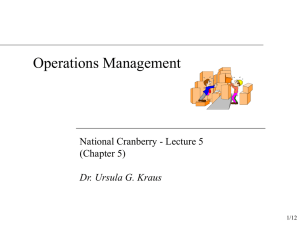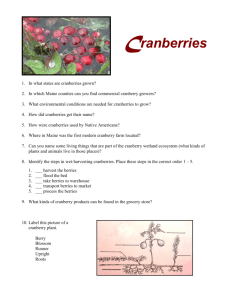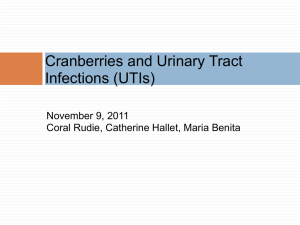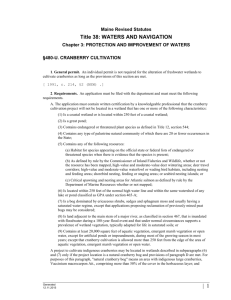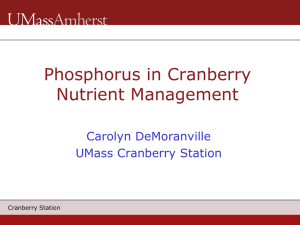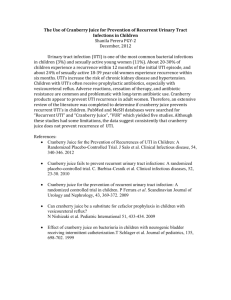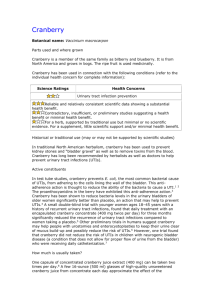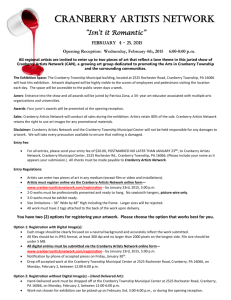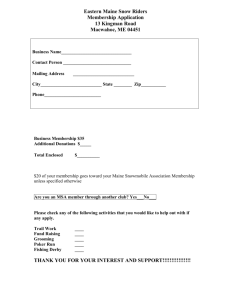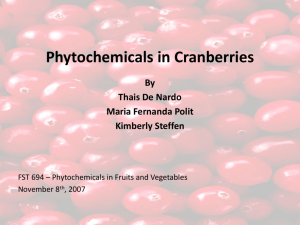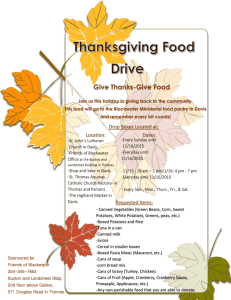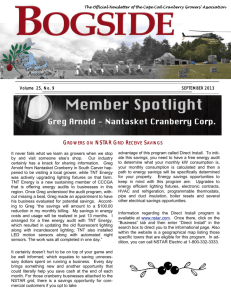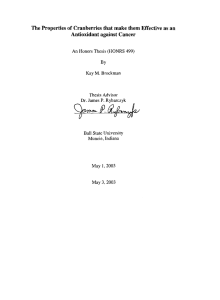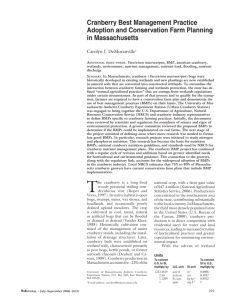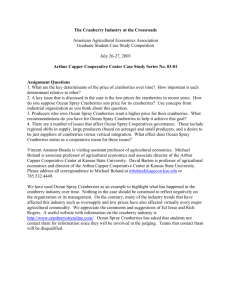Timeline of Major or Noteworthy Cranberry Events
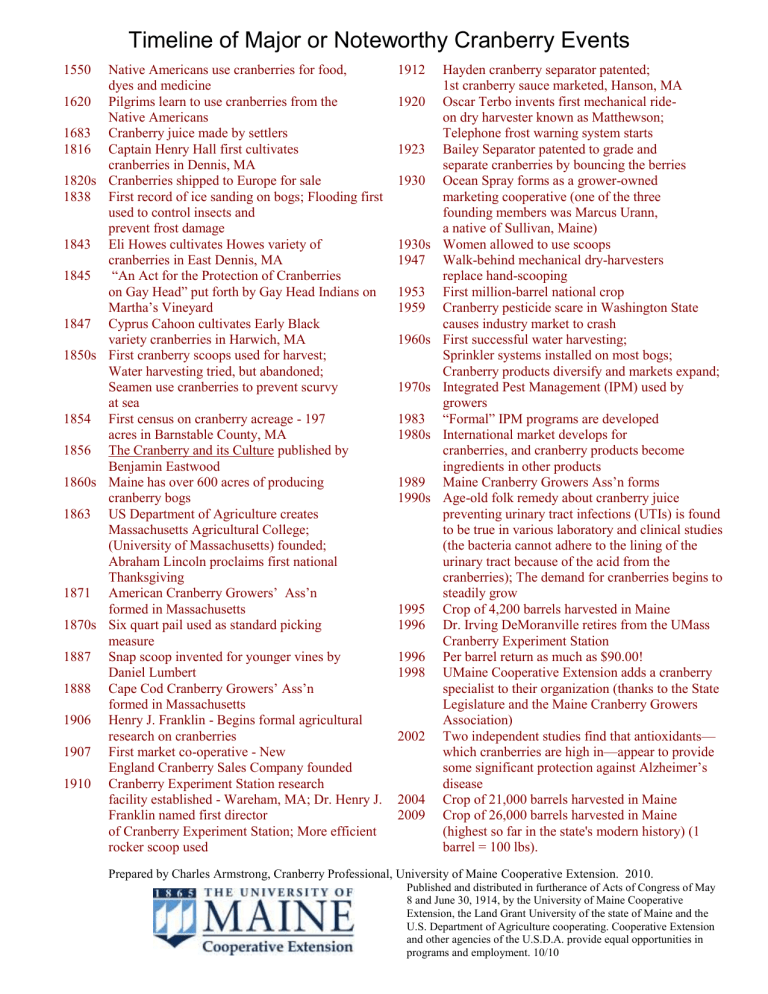
Timeline of Major or Noteworthy Cranberry Events
1550 Native Americans use cranberries for food, 1912 Hayden cranberry separator patented; dyes and medicine
1620 Pilgrims learn to use cranberries from the
Native Americans
1683 Cranberry juice made by settlers
1816 Captain Henry Hall first cultivates cranberries in Dennis, MA
1820s Cranberries shipped to Europe for sale
1838 First record of ice sanding on bogs; Flooding first used to control insects and prevent frost damage
1843 Eli Howes cultivates Howes variety of cranberries in East Dennis, MA
1845 “An Act for the Protection of Cranberries on Gay Head” put forth by Gay Head Indians on
Martha’s Vineyard
1847 Cyprus Cahoon cultivates Early Black variety cranberries in Harwich, MA
1850s First cranberry scoops used for harvest;
Water harvesting tried, but abandoned;
Seamen use cranberries to prevent scurvy at sea
1854 First census on cranberry acreage - 197 acres in Barnstable County, MA
1856 The Cranberry and its Culture published by
Benjamin Eastwood
1860s Maine has over 600 acres of producing cranberry bogs
1863 US Department of Agriculture creates
Massachusetts Agricultural College;
(University of Massachusetts) founded;
Abraham Lincoln proclaims first national
Thanksgiving
1871
American Cranberry Growers’ Ass’n formed in Massachusetts
1870s Six quart pail used as standard picking measure
1887 Snap scoop invented for younger vines by
Daniel Lumbert
1888
Cape Cod Cranberry Growers’ Ass’n formed in Massachusetts
1906 Henry J. Franklin - Begins formal agricultural research on cranberries
1st cranberry sauce marketed, Hanson, MA
1920 Oscar Terbo invents first mechanical ride- on dry harvester known as Matthewson;
Telephone frost warning system starts
1923 Bailey Separator patented to grade and separate cranberries by bouncing the berries
1930 Ocean Spray forms as a grower-owned marketing cooperative (one of the three founding members was Marcus Urann, a native of Sullivan, Maine)
1930s Women allowed to use scoops
1947 Walk-behind mechanical dry-harvesters replace hand-scooping
1953 First million-barrel national crop
1959 Cranberry pesticide scare in Washington State causes industry market to crash
1960s First successful water harvesting;
Sprinkler systems installed on most bogs;
Cranberry products diversify and markets expand;
1970s Integrated Pest Management (IPM) used by growers
1983 “Formal” IPM programs are developed
1980s International market develops for cranberries, and cranberry products become ingredients in other products
1989
Maine Cranberry Growers Ass’n forms
1990s Age-old folk remedy about cranberry juice preventing urinary tract infections (UTIs) is found to be true in various laboratory and clinical studies
(the bacteria cannot adhere to the lining of the urinary tract because of the acid from the cranberries); The demand for cranberries begins to steadily grow
1995 Crop of 4,200 barrels harvested in Maine
1996 Dr. Irving DeMoranville retires from the UMass
Cranberry Experiment Station
1996 Per barrel return as much as $90.00!
1998 UMaine Cooperative Extension adds a cranberry specialist to their organization (thanks to the State
Legislature and the Maine Cranberry Growers
Association)
2002 Two independent studies find that antioxidants—
1907 First market co-operative - New
England Cranberry Sales Company founded
1910 Cranberry Experiment Station research facility established - Wareham, MA; Dr. Henry J.
Franklin named first director of Cranberry Experiment Station; More efficient rocker scoop used
2004
2009 which cranberries are high in—appear to provide some significant protection against Alzheimer’s disease
Crop of 21,000 barrels harvested in Maine
Crop of 26,000 barrels harvested in Maine
(highest so far in the state's modern history) (1 barrel = 100 lbs).
Prepared by Charles Armstrong, Cranberry Professional, University of Maine Cooperative Extension. 2010.
Published and distributed in furtherance of Acts of Congress of May
8 and June 30, 1914, by the University of Maine Cooperative
Extension, the Land Grant University of the state of Maine and the
U.S. Department of Agriculture cooperating. Cooperative Extension and other agencies of the U.S.D.A. provide equal opportunities in programs and employment. 10/10
